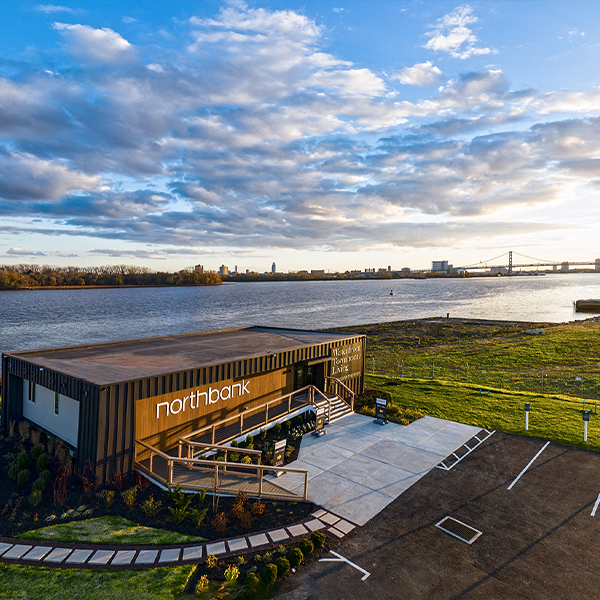Episode Summary:
Being a strong leader means knowing how to weather a storm. Take a listen to our most recent podcast with Grafik’s founder Judy Kirpich and our CEO Lance Wain, as they discuss unique perspectives on the types of leadership, people and ideas that can help make an agency and a small business resilient and successful during turbulent times.
Host: Clara Shannon, Marketing Associate, Grafik
Voices: Judy Kirpich, Grafik Founder & Former CEO
Transcript:
Clara:
The definition of what it means to be a leader has changed dramatically over the course of the past two months.
In times of crisis, we long for someone to guide us through uncertainty — someone who will help us feel secure and safe, who knows how to push forward, exceed limitations, and come out stronger on the other side.
As the world has struggled to make sense of COVID-19, we’ve seen leadership from all areas of life step up to the plate – from local governments, to frontline workers, to chefs, to school teachers, and more.
Every leader has been faced with moments of crisis, ranging from brief bumps in the road to more sustained issues. But…navigating the global pandemic we’re currently living-in has no playbook -no best-practice, no modern-day precedent.
I posed a few questions to Grafik’s founder, Judy Kirpich and our current CEO Lance Wain, for their thoughts on what strong leadership means as well as ideas that can help make an agency, and a small business, resilient during turbulent times.
Take a listen, and we hope you enjoy.
Lance, as we get started, could you give us a little bit of background into your relationship with Judy?
Lance:
I’ve known Judy for 19 years, and she hired me in 2001 to run business development and over the first five to 10 years of working together, she really started to groom me in a manner of how to start to take a look at the business a little differently than what I was accustomed to. And she also set me up to eventually take over for her when she retired. And in 2005, when she moved on to her next chapter, we’ve actually kept a very strong bond. We talked quite frequently in terms of the state of the business, we talk about challenges that I may be facing, we talk about what’s going on in our personal lives and in our families and, and how to balance everything that’s going on in the work world as well as our personal lives. And it’s really been an invaluable friendship, and a trusted friendship that we’ve been able to establish. And I thought it would be great to have her part of this podcast, in terms of what she’s experienced as a business owner over a 37 year period, with a couple of different economic downturns and then also talk a little bit more about what I’m starting to experience now that we’re dealing with COVID-19.
Judy:
Yes, I’m Judy Kirpich and I started Grafik with another person back in 1978. And I guess I left how long ago, Lance? Probably about five years ago I retired and still keep contact with the firm. And I’m so thankful that I am not the CEO right now, during the pandemic. I think about it often. But looking how Grafik has responded. I see a lot of really good lessons, historical lessons on some of the ways that we used to manage crises. While it might not have been a pandemic, Grafik was actually started in a recession. It was, you know, in ‘78 times were not very good. I wasn’t at the very beginning there. So I really wasn’t privy to a lot of the decision making. But, you know, we’ve been through a lot. We’ve been through the technical bubble bursting, we’ve been through 9/11, we’ve been through the Great Recession, you know, now there’s the pandemic and honestly, there’s a lot of less notable downturns that have occurred over the last 40 years. And I think that I give credit really to the people who work at Grafik because there’s a different kind of mindset. Not on how to operate a firm during a recession, but more importantly, how to operate a firm when things are going well.
Clara:
Each decade in business has presented its own set of challenges for Grafik and our peers. In an industry notorious for chewing creative agencies up and spitting them out at an alarming rate, Lance and Judy both agreed that it’s the relationships between leadership, staff, clients and other partners that have given Grafik its staying power.
Lance:
Leadership right now is being tested on many different levels. And you know, particularly in the agency space, which is often the most susceptible to economic downturns, Judy and I have really been able to, over the last really going on two decades, right now work collaboratively in terms of how best to ensure that Grafik continues to operate and succeed. And as we look at the last few downturns, whether it be 9/11 or looking at the financial collapse of 2007/2008, there’s a couple of important lessons that are learned. And I think this current situation is different on a few different levels. But what really jumps out at me, for starters, is going back to 9/11. It was a period in time that had this profound sadness, and a sense of most people just not feeling safe because of so many of the unknowns that were occurring at the time. But what was interesting about Grafik and what was actually very comforting about Grafik is the camaraderie of the staff and the culture that was built up by Judy, you know, and the Grafik team over the years, really helped us get through that emotional challenge that we all felt in a manner that I know many of our peers and competitors did not necessarily get through. And as we start to think about, you know, what happened after that in 2008-2009, and the collapse of the financial institutions, it was so challenging and so difficult, because there was so very little that we could, that we could control. And you know, when this collapse happened, there was this feeling of how best to hang on and, you know, not being able to get a lot of guidance from others in the industry. It was just this somewhat feeling of despair, but again, because of the people, because of the relationships that we were able to build with our clients, it really helped us persevere through what for me was probably, you know, the most challenging business experience I’ve ever had.
Judy:
You know, if we’re talking about that particular period of time, the Great Recession, I think one of the things that I learned more than anything else, is have a great relationship with your banker, which we did not. I was very proud. And this was a mistake, but I was very proud that for the entire tenure of my leadership, we didn’t have debt. We didn’t owe anything. We had a line of credit. There was always a cushion, it was great to know it was there and honestly every year it was renewed automatically. And then all of a sudden we had the Great Recession and our banker who I thought would be, you know, just stamped, no problem comes and says, “Well, you know, you haven’t borrowed money, so we’re not going to extend you a line of credit.” And it’s like, what are you talking about? I had no relationship because honestly, I didn’t care about it. I left that to others. And I think that was a huge mistake. I mean, we weathered the storm, but make sure that you have a landlord that you can work with.
Lance:
You know, I was saying 12 years later, you know, those lessons have served us well, because we have formed relationships with the bankers and it’s been invaluable in terms of looking at the different programs available to small businesses now. So again, what we went through in 2008-2009 really set us up to stabilize the business as it pertains to moving forward because of the current current crisis.
Clara:
Grafik looks very different now than it did back in 1978. But some business philosophies have been passed down from one leader to the next and are still very much alive in the Grafik of today.
Lance:
We’ve adapted as a company with each decade. It’s almost like the Rolling Stones. But we’ve been very consistent in terms of how we run the business and Judy, you said to me from the moment you hired me, is, we always need to operate like we’re in a recession that has really been a hallmark of how you run this business. And it’s how we’re running the business right now. So when you look at the operations, again, always operate like you’re in recession. Always Be kind to those that you work with. And, most importantly, never, ever, ever settle. So as hard as things can get, ensure that you continue to push you to continue to differentiate, because that will help you get through these times.
Judy:
I think the other thing that was notable about Grafik in the really early days is look you know, graphic designers, which is what I was called back then, we care about creativity, and most graphic designers ran very small shops, and they hated what I will call the business of design. And Grafik was successful because we focus not only on design, but also how to run a business. What does it mean to have payables and receivables? What does it mean to look at aging reports and work in progress? And what does it mean to not just have an accountant once a year, but somebody who’s advising you on a monthly basis? What does it mean to keep track of your time, and more importantly, back then, most staff had no clue what they were being billed out at and what our budget was. And in Grafik, one of the most notable things is from the very, very, very beginning. We made all of our staff understand the importance of a budget. Now, that’s not to say we didn’t blow budgets. We blew budgets, you know, on our side, continually because that pursuit of excellence unfortunately, you can’t. You can’t say you just have five hours if it takes 10 hours to get something great. You put the 10 hours in, but we set up some systems so that if a budget was blown, it wasn’t blown, like catastrophically. And, and what we did, which I think was really important is we taught everybody that you can be a great designer, but you better be a great business person. And I think one of the things that I’m pleased about is, you know, there have been other firms that, you know, have designers who’ve left and moved or whatever and stopped, you know, started their own firms and they know how to start a business. And that’s because we trained them. And I think that that aspect, you know, is so important, you cannot, I don’t think you can, shield your staff from the business side. And, and I think that we always operated the business with a lot of transparency, probably more transparency than most firms. But you have to look not just at the big picture, which I’m not as good as Lance. Lance is much better at this than I am, but also at the small parts of the business, you know, where money tends to kind of leak out. And I think that if you share that philosophy with your staff, I think it really builds a strong foundation.
Lance:
I think the operative word there is share, and you were always a big proponent of sharing whether it’s personal feelings, personal stories, you know, what’s top of mind. And I’ve continued that in terms of making sure that we are sharing as much information as we can in terms of the state of the business and this is in good times as well as in challenging times. Because part of the beauty of a small business is we all have the opportunity to to have an impact in terms of our success. And it is something that I think the staff has really embraced, that transparency and that opportunity to be in the know so that they can help make a difference in terms of how we are, you know, performing and moving forward as a company.
But what I learned as a business person by working through some of these challenges, is that top line and bottom line, it really has to be balanced with humanity. Okay? Because it really was that humanity aspect to Grafik, which has kept people here for 10, 15, 20, 25, 30 years, it’s kept clients with us for decades because it’s not just about the bottom line. And I think being able to strike that right balance, again in good times and challenging times is really critical. And it really has enabled us to create kind of an impact for the people, whether it’s alumni or current staff or again, clients that still come back to us, that that’s what they know us for. And I think that really is a hallmark again, of how you built this agency.
Clara:
Economic downturns don’t just impact the way a business is run internally, they also impact the relationship between agency and client. Studies have shown that in 1984, the average client-agency relationship tenure was 7 years. By 1997 (13 years later), that number declined by 25% to 5 years. Today the average client-agency tenure is thought to be less than three years. Over our 40-year history, Grafik has learned a lot about how to continue growing and strengthening trusted client relationships in both good times and bad.
Judy:
You can’t burn bridges. And you can’t let pride guide your decision making. So what does that have to do with a recession or tight times? Well, Grafik got through tight times, because during a tight time you take the business that comes in. And that often means dealing with some real assholes. People who understand that the power balance is changed. And it’s very difficult when you know, we like to be partners with our clients. And I think we’re excellent partners. During a recession sometimes the power balance changes dramatically. And so you will have clients who understand that you need their work, and they’re going to drive the price down, and they’re going to be unreasonable, and they’re going to be unpleasant. And we had in every single one of these recessions, and I will not name names, we had one or two clients that I remember to this day who were particularly unpleasant to deal with. But you know what? You smile. And you realize even though you’ve just walked away with, you know, 20 Best of Design Awards, you do their business card, if that’s what’s needed, or you do their, you know, some job that you thought you’d never have to do again, you do, because you’ve got to keep that cash coming in. And that, honestly, that is one of the things that was the hardest for me to deal with because I like control. And sometimes during a really tight time, you don’t have a whole lot of control. These recessions were totally out of our control, as is the pandemic, you know, we have no way of knowing exactly when it’s going to end and how the client’s gonna react.
Lance:
You know, it’s interesting you say this because I agree with you. I recall the dot-com bubble bursting, I recall the 2008-2009 Great Recession. And when I look at it now, though it is different. And in a way, I wish you could experience this, but I know you want nothing to do with this….but there’s a level of professional courtesy, which I didn’t see in the last two downturns. And some of it is probably just a result of we’re all trying to figure this out together. But there’s also this, this…this sense of flexibility and not trying to take advantage of a situation.
You know, we’ve been fortunate that we continue to pitch new business, we’ve closed some deals. And the new clients, they’ve said to us, “cash flow may be an issue for the next four to six weeks. You know, if it makes you feel better, we can start at a later date or we can work on some type of promissory notes. We don’t want to put you in an uncomfortable position, we want to be very transparent in terms of where we’re at.” And that is actually a relief. Because, Judy, I think, to your point, then you’re not really losing control. It’s a matter of working more closely with your clients and your prospects in terms of a business arrangement that works for all sides. So it has been very reassuring, at least over the first six or seven weeks of this current situation where I don’t feel like, we’re losing control and I don’t feel like we actually have to go out there and chase the wrong types of business. It is the business that makes sense for us.
Clara:
Hindsight is 20/20, but the reality of most challenging situations is that in the thick of the storm, mistakes are made despite the best of intentions, and lessons unfortunately have to be learned the hard way. I asked Judy and Lance to reflect on some of the common mistakes they think leaders often make during a crisis like this, and what we can learn from those.
Lance:
Here’s what I would say, Judy, you may have a different opinion, but what I would say is, I think strong leadership in a sudden crisis really requires one to respond and not just react. For me, reacting is often emotionally driven. And that can often have negative consequences on creative, on financial and on staffing. You know, for me responding to the situation in a proactive manner that allows you to maintain that objectivity, I think is so critical and that will really help set one up to properly weather a storm. And again, I’ve been on the flip side, where in the past I have reacted more emotionally, but you learn from that, right? You learn from that and, you know, you know sometimes as an emotionally driven person…It is hard to suppress that, but I think that these experiences and for any small business, I can think about responding before you start to react. Again, you may have a different opinion on that.
Judy:
I think that’s what you aspire to, you know, it’s not always doable. I think that the other thing…which is the issue of response, I suppose is it’s keeping those lines of communication crystal clear, open. I mean, whether it’s between your clients or your vendors or your staff. You know, it is picking up the phone and saying, ‘I may have trouble paying this bill, but you will get it and you know, Grafik has a stellar reputation. So that’s helped us over the years, you know, we’ve never not paid our bills. You know, I think, it’s always hard when something comes out of the blue, it doesn’t have to be huge. You know, it doesn’t have to be a pandemic or a terrorist event or a recession. Things happen in business all of the time. You know, a client goes belly up, and the next thing you know, is declaring bankruptcy and you’re our $100,000. And when you are building a firm, that’s a very difficult thing to bear. But I think that what you know, one of the reasons you bear it is because you’ve managed the firm all along. You know, I’m the person who was going out of business for 37 years. That is really true, for 37 years I believed every month we were going out of business. And I managed the firm that way and I promptly drove my staff insane. Lance had a lot of sleepless nights. Because it’s like, you know, where the hell is the business Lance? Bring in the damn business.
But that wasn’t enough. That wasn’t enough. You know, it’s never enough when you’re sitting in that corner office, and you’re looking at books that are going into the red and you’re not used to being in the red. You know, it’s funny, looking at the books often is really important. And looking at it with the historical perspective is often important, and it’s so different, you know, right now I am not looking at any of my finances whatsoever at home, not Grafik. I’m not looking at Grafik finances either. But, you know, I with the market the way it is, I’m not looking at it, I’m closing my eyes. I’m thinking, Okay, you know, in a couple years I’ll look at it again and I just refuse to drive myself nuts. Well, when you have a business, you don’t have that luxury. Okay, you have to look at the reading. And you have to look at the downturn also knowing that there will be an upturn. So you’ve got to you’ve got to because sometimes it’s painful, you know, because it does make your stomach hurt. There’s nothing easy about getting through a tough time you know, but you have to just remember that good times will come back. You know, you just have to.
Lance:
One of the lessons you always taught me is yes, look at the numbers. But don’t let them paralyze you. And you can appreciate Judy, right, we’ve got more numbers at our disposal now than we ever have. And I, you know, what’s most important is really understanding trends versus just looking at, you know, where you stand on a day in and day out basis. I think that has really allowed us as a business, to continue down the path of not overthinking, or over analyzing any particular week or month, but making sure that you know, you are following trends. And I think that the historicals actually do come into play there, just so you can see in different climates and different cycles, because history does often repeat itself. I know that sounds cliche, but it’s so very true. And I think that that allows us to, to not get too excited when things are going well. And also not get to down when you have these challenges, and I think that’s kind of where we’re at right now in terms of the current state is yes, there are a lot of challenges, but we know based on those previous experiences that we will get through this.
Clara:
In a situation that seems to be changing by the hour, it can be tempting to get caught up in the immediate details and as Lance said, “react” instead of respond. As a leader, what’s the right balance of short-term and long-term planning? When should we be thinking about the “now” vs. four and five years down the road?
Lance:
Here’s my take. Again, you may approach this a little differently. But I truly believe it’s a balance because if we do use the current situation as an example, the first few weeks my attention was really focused on the stabilization of the business with a couple key drivers.
Number one, obviously finances. You always need to make sure you’ve got the finances in check, make sure that the cash flow is still there. And to your point, we still do not subscribe to debt financing, that that’s not how we operate.
So finances number one, frequent communication as you were alluding to, and in this situation, as you know, Judy, because we talk often, is, I over communicate with the staff. I think that’s actually really important right now, especially while we’re all apart so people know what is top of mind and how are we doing. I don’t want silence to be deafening in that regard.
So finances, frequent communication, and ensuring that we could still support our existing client load, which I think is important. And as you referenced, you know, being able to reach out to your clients and letting them know where you stand and what we need to do moving forward to ensure that we can support them, while also nurturing our pipeline, because you can never forget about, you know, what’s down the road. And as I look at that, finding that right balance, there was the situation of, yes, let’s make sure there’s stabilization. But as I just mentioned to the staff, (I’m doing video diaries for the staff) I’m of the mindset right now that we have to have a kind of, ‘let’s go’ mentality. Let’s start to think about what are the next steps, where do we continue to move as an agency?
For me, it’s not four or five years because I think that’s an eternity. What I’m focusing on right now is, what does the next 3, 6, 9, 12 months look like? Because there’s so much…aA lot of uncertainties and unknowns. And if I plan too far ahead, I feel like I’m being really short sighted in terms of making sure that we’re able to address any immediate challenges. So, my mindset right now is really focused on getting through the rest of 2020 and then continue to evolve and start to think about, you know, the future from there. I don’t know if you have a different perspective.
Judy:
No, I think that’s absolutely right. As you well know, I have often been asked by people what my five year plan is, and I answer I have no idea. I don’t do five year plans. I will say that one of the things that has helped me currently is a podcast, and every business owner should be listening to it. It’s on NPR, it’s, ‘How I Built This,’ and the reason it is so valuable as a podcast is it provides… Basically, you know, owners who’ve built all kinds of businesses small, large, behemoths. And every single situation there has been a huge crisis. Okay, every single one, you know, there’s almost no business that has just gone straight to the top without some type of horrible thing happening. And when you hear these stories and you look at the firms that they’ve built,, one thing that’s constant is… you marshal your reserves and you push forward. You don’t give up. I guess it’s grit. That’s the perfect word for right now. You can’t just tear your hair out and say, “Oh, my, woe is me,” because you know what?You’ll be out of business in a second. You have to realize that if you can get through a period like this, and Grafik will, I have no doubt about that…If you can get through a period like this, man, the picking is pretty ripe. Because there’s so many people that go out of business because they have no idea what to do. And if you get to the other side of it, you’re going to come out a lot stronger than you ever thought, you know.
Lance:
I know you study leadership a lot. Who has really impressed you in the current crisis?
Judy:
In the current crisis, oh God… Well, not Donald Trump, how’s that?
Lance:
I was waiting for you to throw something in there.
Judy:
I mean, right now, I feel that there are…God, there’s so many companies and corporations that are so disingenuous that I want to vomit.
Who does it well? Well, you know, I’ll tell you I had an experience this morning that maybe was an example of who does it well, and that’s Trader Joe’s. They’ve kept to their brand, I will tell you.
So there’s a greeter at the door. Who is in front of your face disinfecting every single cart, who is as pleasant as pleasant can be. You walk in, there are rules there. They’re very clear but they tell you those rules with a little bit of tongue in cheek. And if you don’t know you’re not allowed to bring your own bags (all these years we’ve been trained to bring our own bags, now we can’t bring them in) they have accommodations for those of us who bring our bags in and didn’t realize. And then there’s little signs all over that kind of tell you you can only get one of these or you can only get one of these, but it’s done in a very friendly low key way and and the stores are…you know, well i’ll tell you I never got through a line so quickly in my life, there was no line because they’re monitoring how many people come in. And so yeah, there was a pain in the ass to have to wait for 20 minutes, but once I got in, it was a piece of cake, and I use them because every checker, every person stocking the vegetables and the produce, are Trader Joe’s employees, so they were all very hip and very friendly and they were not disingenuous. I think that too many of the corporations right now are so disingenuous.
I got a letter from the CEO at American Airlines. It was the worst letter I ever saw because you know, I think that they, you know, they say they care about people, but they’re, laying off their staff, they’re not paying for benefits, all kinds of stuff. With Trader Joe’s, they’re going to get through this and they’re going to get people who will continue to shop there because I really felt like they cared about ME. They cared that you know, I could get in and out and they made it safe and still an enjoyable thing. So I guess that would be one that I’d think of as, as you know, kind of a corporation that’s doing it the right way.
Lance:
I will not try to bring politics into this. But I do believe a leader that has been very true to who he is and very genuine, is actually the governor of Maryland. I think Hogan has done a stellar job in terms in terms of being ahead of the game. He has never settled. And he, really more importantly, wasn’t fazed by opinions or partisan politics. And really, you know, focusing on his constituents, focusing on the people that he represents.
Judy:
I agree.
Lance:
I think he has done a hell of a job, whether you’re a Democrat or Republican or independent. I don’t know anybody that can argue with what he has meant to the state of Maryland, and not succumbing to everything else that’s going on out there in the market. So I’ve been very impressed with his leadership style.
Clara:
As other small businesses and agencies navigate the current situation and uncertainty around us, for many this is the first pronounced period of hardship they’re experiencing after several years of growth and success. I asked Judy and Lance to share any parting wisdom they have for other CEOs and peers based on their own shared experience.
Judy:
Well, it’s what I keep saying, always manage your business like it’s a recession. Okay, you’re gonna get out of it. But then, you know, don’t start spending lavish money and, you know, big fancy parties. I guess I would say spend and manage your business like it’s always a recession, and make sure that your business relationships are solid, and that’s between your bank, your clients, your real estate broker.
Lance:
Yeah. And what I would say is, and I learned this from our leadership groups on a part of is, you know, the advice I really have to offer is don’t wait for clarity to make a decision. Because by the time the clarity happens, it will probably be too late. So part of our job and your leadership Role is we have to take some risks. We have to use again, knowledge and and lessons learned to help inform how best to move a business forward. And you know what, while things are a little cloudy right now, we are forced to make certain decisions. And that’s just part of the part of the being in this role. So, again, don’t wait for clarity to make a decision is my advice.
Clara:
As developments of COVID19 continue to surface, we urge you all to stay safe, and to stay at home.
There will be more updates to come – so please follow along on our site, grafik.agency or follow us on social media, @grafikagency.
I’m Clara Shannon, and you’re listening to Studio G.






